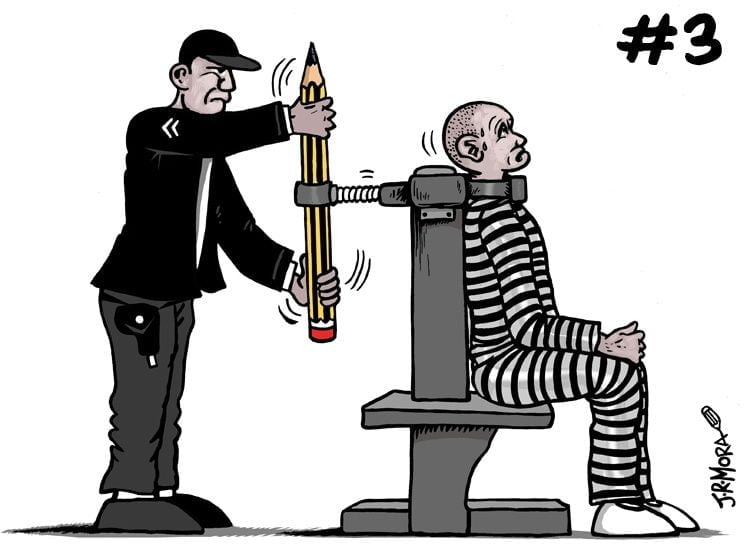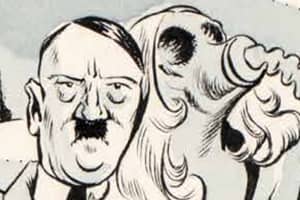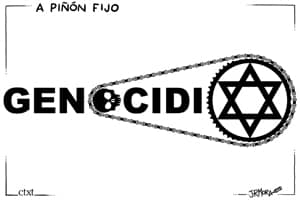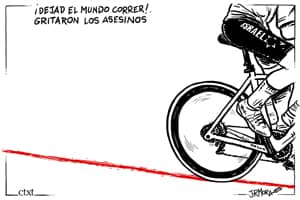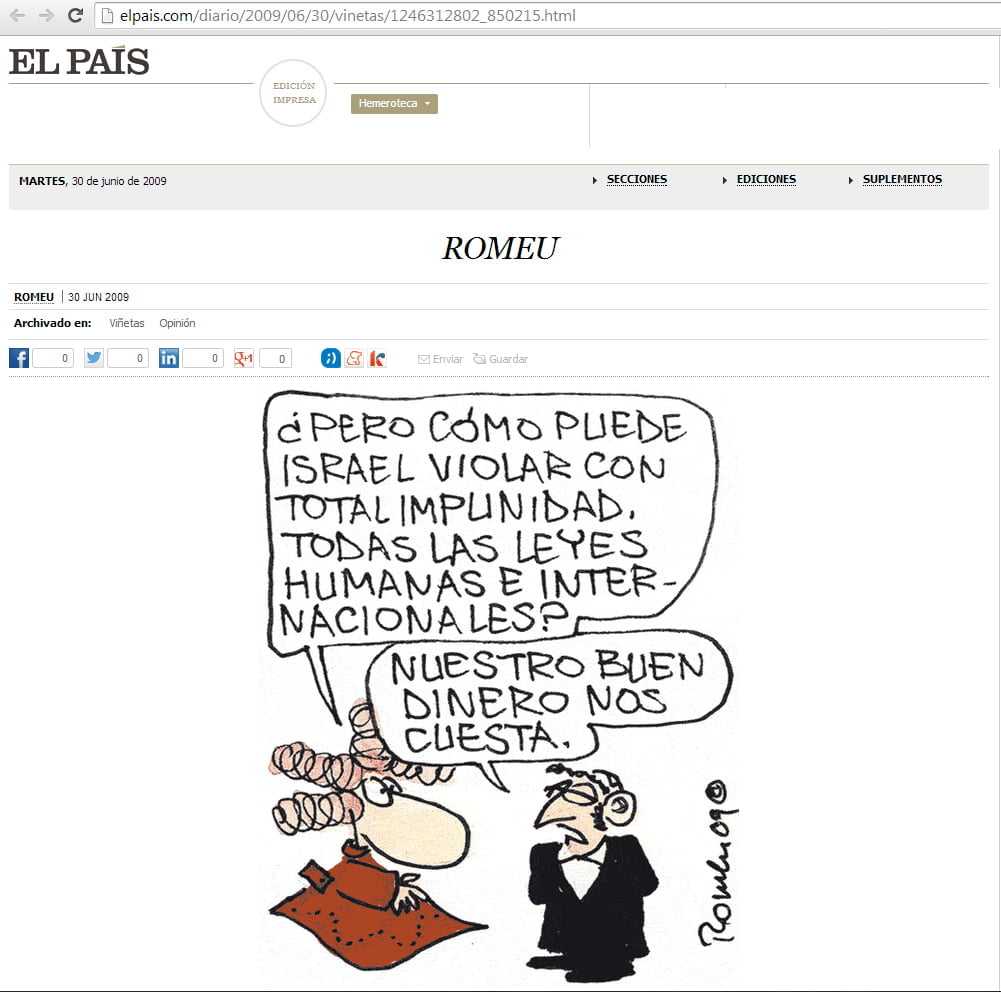
Translation of the cartoon: The female character asks: "But how can Israel violate with impunity all human and international laws? The man answers: "Our good money is costing us".
It was not the first time that cartoons about Israel's condemnable actions in Palestine provoked complaints and accusations of anti-Semitism (the eternal catch-all to respond to any criticism of the State of Israel), but this cartoon by Carles Romeu Müller, "Romeu", in El País of 30 June 2009 was the reason for Jacobo Israel Garzón, president of the Federation of Jewish Communities of Spain, to send a letter to the newspaper entitled "Tópicos" (Topics), which was published on 3 July.
In it, he not only accuses Romeu of anti-Semitism, but also compares the publication of the cartoon to Nazi propaganda cartoons:
"The cartoonist Romeu resorts to anti-Jewish clichés and libels to express his particular vision of the Israeli-Palestinian conflict. The character who responds to the "humanitarian" interpellation is portrayed as an ultra-orthodox religious man (with kippah and ringlets), with stereotypical physiognomic features and displaying an expression ("Our good money has cost us") that refers to the stereotype about the conspiratorial nature, power and influence of "the Jews", as well as their irremissible association with money and greed.
A caricature not unlike those published by Goebbels in Nazi Germany, which unleashed a brutal hatred of Jews and which ended, as we all know, by bleeding Europe dry".
Other groups such as the Anti-Defamation League and individuals also singled out Romeu and El País as anti-Semitic.
The AJC (Global Jewish Advocacy) has previously expressed its discomfort with this other Romeu cartoon from 30 December 2008.

Translation of the cartoon, character on the left (in red): "First of all, Palestine belongs to the Palestinians and not to the Israelis, the Hebrew myths are false and abusing the weak is disgusting", character on the right (in black): "We are the chosen people of the god we invented for ourselves".
The AJC issued a statement, in the words of its executive director David Harris, calling the cartoonist an anti-Semite and calling for his dismissal in a somewhat peculiar way (see bold):
Romeu's cartoon, published on 29 June, shows a character who asks: "But how can Israel violate with impunity all human and international laws? The orthodox Jew replies: "Our good money is costing us.
"Will El País go back to publishing Romeu's anti-Semitism? Or will the paper do the right thing by apologising and guaranteeing that such egregious bigotry will not be allowed in the future?" said Harris."If El País wants to retain its dignity and credibility, there is no place for the Romeu's of this world."
Concern about anti-Semitism in Spain has been particularly acute in the last year, following a Pew Research survey in which 46 per cent of Spaniards surveyed - the highest number in Europe - said they had negative views of Jews.
Fourteen US Congressmen (10 Democrats and 4 Republicans), in a letter dated 1 May 2009 sent to the then Prime Minister J.L. Zapatero, expressed concern about what they saw as a rise in anti-Semitism in Spain and called for it to be curbed.
In it, they also alluded to El País, pointing out that it published articles and cartoons depicting anti-Israeli stereotypes. Interestingly, the letter was addressed to the prime minister of"the republic is Spain" (See letter-PDF).
Neo-Nazi fanzine
Israel's ambassador to Spain, Raphael Schutz, in a brief letter to the editor (6 July 2009) branded the newspaper a neo-Nazi fanzine.
"It is not the first time that your newspaper has published an anti-Semitic cartoon by Romeu (or others). The one that appeared on 30 June goes beyond all permissible limits. It is an affront to the Jewish people. The cartoon contains the same infamous anti-Semitic clichés that appeared in the anti-Jewish press of Nazi Germany: the Jew is outside humanity, international conspiracy to control the world, economic domination, greed... and, of course, a hooked nose, black frock coat and ringlets.
The publication of this kind of cartoons seems more typical of a neo-Nazi fanzine than a serious newspaper.
The ambassador left his post in July 2011 criticising"the hatred and anti-Semitism in Spanish society".
Although today many people link the cartoon of 30 June 2009 as the direct cause of his dismissal from El País, Romeu himself said that he was dismissed six months later, on 24 December 2009. On that day he was informed that he would not continue, but technically the cartoonist was not fired until early 2011, although the newspaper stopped publishing his cartoons long before terminating his contract. Romeu's last cartoon was published on 31 December 2009.
On 11 February 2010, the reader's ombudsman at the time, Milagros Pérez Oliva, answered toa reader's question about the absence of the cartoonist(capture) without relating these incidents, and the deputy director, Vicente Jiménez, also answered without any allusion to the possible relationship between these cartoons and the disappearance of his contributions.
Two years later, some columnists(1) -(2) from various media criticised the showing of Romeu's cartoon (from June 2009) on TVE, as part of a special content on the 50th anniversary of Mafalda broadcast on 15 March 2012, and called for apologies and resignations for broadcasting "anti-Semitic rubbish".
Romeu worked at El País for 33 years, from the birth of the newspaper on 4 May 1976 until 2011, publishing until 31 December 2009, although the author recalls in an interview that he was fired on Christmas Eve, in fact he was given a ticket wishing him a Merry Christmas.
In the same interview, in 2012, he confesses to being "almost retired" and at the end of that same year he published his autobiography in comics, entitled"Ahora que aún me acuerdo de todo (o casi)"(Now that I still remember everything (or almost) with Astiberri. Preview 25 pages(local download).
In an interview in the programme Uhintifada nº 112 of April 2012, Romeu talks about the issue. I rescued the cut and saved it because the player used Flash and, as you know, Flash disappeared.
Romeu died on 24 July 2021 at the age of 73.
Local download file: interview-romeu-23-04-12-uhintifada112.mp3
Download or listen to a cut of the interview in Archive (Duration, 17 minutes).
Humour in trouble, a collection of cases
Cases of cartoonists who have had problems of some importance because of their cartoons or satirical illustrations. There are also some stories of other people who, without being cartoonists, have got into trouble for sharing them.
